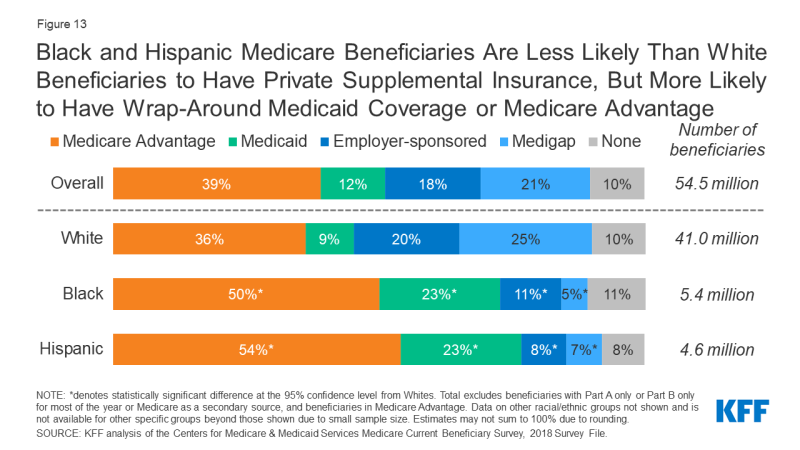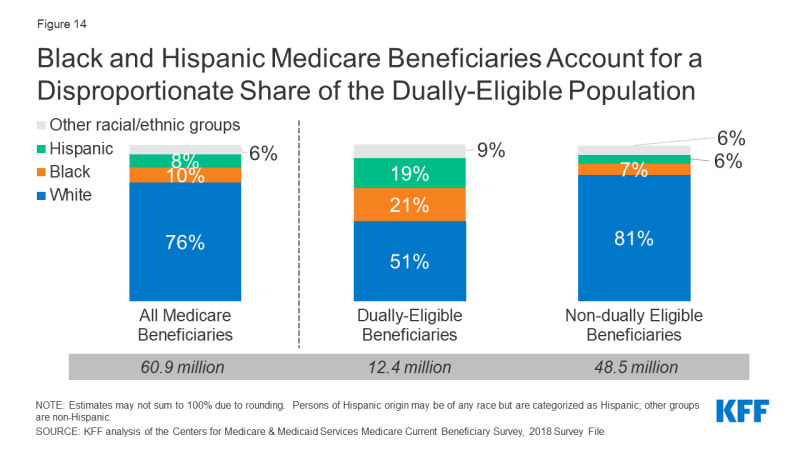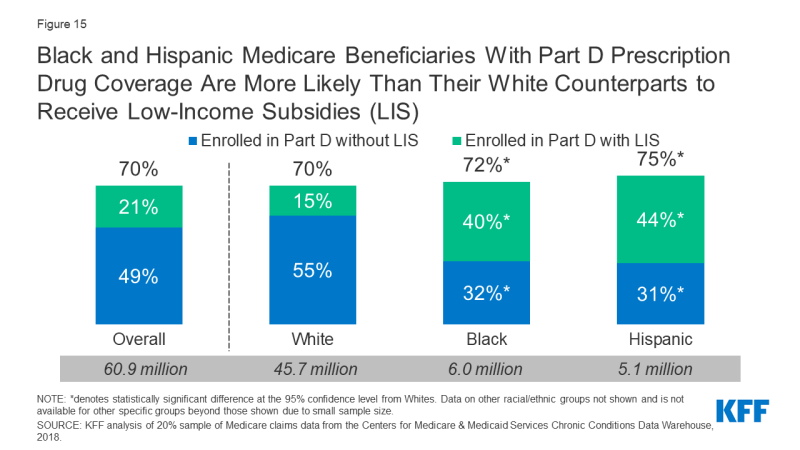Racial and Ethnic Health Inequities and Medicare
Sources of Coverage Among Medicare Beneficiaries
Black and Hispanic Medicare Beneficiaries Are Less Likely Than White Beneficiaries to Have Private Supplemental Insurance, but More Likely to Have Wrap-Around Medicaid coverage or Be Enrolled in Medicare Advantage
The vast majority of Medicare beneficiaries across all racial and ethnic groups have some source of supplemental coverage. However, sources of supplemental coverage in Medicare vary by race and ethnicity. While a quarter of White beneficiaries have Medigap, also known as Medicare Supplement Insurance, only 5% of Black beneficiaries and 7% of Hispanic beneficiaries do so (Figure 13, Table 2). Medigap helps to fill in the gaps in traditional Medicare by fully or partially covering Part A and Part B cost-sharing requirements. Black and Hispanic beneficiaries are also less likely than White beneficiaries to have employer or union-sponsored retiree health benefits to supplement Medicare.

Figure 13: Black and Hispanic Medicare Beneficiaries Are Less Likely Than White Beneficiaries to Have Private Supplemental Insurance, But More Likely to Have Wrap-Around Medicaid Coverage or Medicare Advantage
Medicaid provides supplemental coverage to nearly a quarter (23%) of Black and Hispanic beneficiaries, the federal-state program that provides coverage to low-income people, compared to just 9% of White beneficiaries. Additionally, half of Black (50%) and Hispanic (54%) beneficiaries were enrolled in a Medicare Advantage plan in 2018, as compared to just over one third of all White beneficiaries (36%).
Black and Hispanic Beneficiaries Account for a Disproportionate Share of Beneficiaries Dually Eligible for Both Medicare and Medicaid
Medicaid, the federal-state program that provides coverage to low-income people, is a source of supplemental coverage for Medicare beneficiaries with low incomes and modest assets. Most dually eligible beneficiaries receive both full Medicaid benefits, including long-term services and supports, and payment of their Medicare premiums and cost sharing. Others do not qualify for full Medicaid benefits, but Medicaid covers their Medicare premiums and/or cost sharing through the Medicare Savings Programs.
Together, Black and Hispanic beneficiaries account for 18% of the total Medicare population, but 40% of the Medicare-Medicaid dually eligible population (Figure 14). Compared to all traditional Medicare beneficiaries, dual-eligible beneficiaries are more likely to report poor/fair health status, have lower income, and qualify for Medicare due to a permanent disability.

Figure 14: Black and Hispanic Medicare Beneficiaries Account for a Disproportionate Share of the Dually-Eligible Population
Black and Hispanic Medicare Beneficiaries With Part D Prescription Drug Coverage Are More Likely Than Their White Counterparts to Receive Low-Income Subsidies
The Medicare Part D program provides outpatient prescription drug coverage to Medicare beneficiaries. The majority (70%) of Medicare beneficiaries were enrolled in a Part D drug plan in 2018, with rates of Part D enrollment higher among Black (72%) and Hispanic (75%) beneficiaries than White beneficiaries (70%) (Figure 15).

Figure 15: Black and Hispanic Medicare Beneficiaries With Part D Prescription Drug Coverage Are More Likely Than Their White Counterparts to Receive Low-Income Subsidies (LIS)
This may be partly a function of higher rates of enrollment in Medicaid among Black and Hispanic Medicare beneficiaries than among White beneficiaries, since dual-eligible beneficiaries are automatically enrolled in the Part D program and the Part D Low-Income Subsidy (LIS) program, which provides assistance with Part D premiums and cost sharing. Substantially larger shares (40% and 44%, respectively) of all Black and Hispanic beneficiaries were enrolled in Part D and received premium and cost-sharing assistance through the LIS program, compared to 15% of White beneficiaries.
